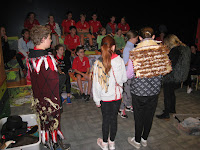It was shocking to learn about just how much land was lost by the Maori.
The advantage was heavily weighted towards the Europeans as they had a lot more experience, resources, and numbers of soldiers. The British army swelled to about 14 000 men. The Maori could only gather about 4000 men, and only some of the time, as they had to also provide for their families.
We also learnt about kupapa who were Maori that supported the British and fought for them. It was fascinating to hear about how Duncan Cameron and his troops snuck, under the cover of darkness, past the well defended pa at Paterangi and onto land (Rangiaowhia) that kupapa had recommended.
Approximately 2250 Maori died (250 kupapa) and 560 European.
The students got to handle some weapons used by the Maori - patu, taiaha, and muskets. The students also got to put on special gloves so they could handle 150 year old artifacts from the wars. A real privilege!
Next week the students get to visit two of the war sites - Rangiaowhia and Alexandra Redoubt.











































